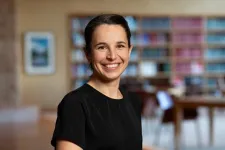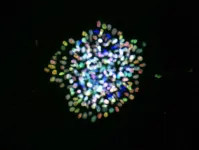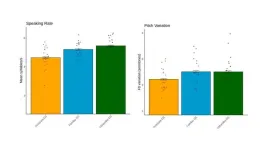(Press-News.org) In an effort to improve early detection of breast cancer and address disparities in outcomes, the US Preventive Services Task Force (USPSTF) has issued updated breast cancer screening recommendations to now advise all women to undergo routine screening every other year starting at age 40 —representing a significant shift from previous guidelines, which recommended screening starting at age 50 and engaging in individualized decision-making for women aged 40 to 49.
The revised guidelines aim to enhance early detection of breast cancer and tackle disparities in breast cancer mortality, particularly among Black women, who are more likely to have aggressive cancer subtypes diagnosed at later stages and face disproportionately higher mortality rates: 40% higher compared to white women in the United States.
While the recommendations offer a step forward in making screening equitable for populations that have been missed with the previously higher screening starting age, challenges remain in ensuring equitable access to screening and addressing gaps in evidence regarding supplemental screening modalities and the adoption of artificial intelligence (AI) technologies, notes Joann Elmore, MD, MPH, a professor of medicine at the David Geffen School of Medicine at UCLA in a newly published editorial in JAMA.
Authored by Dr. Elmore, who is also a member of the UCLA Health Jonsson Comprehensive Cancer Center, and Christopher Lee, MD, MS, from the University of Washington School of Medicine, the editorial discusses the key updates in the recommendations, which along with addressing health inequities include the incorporation of new screening technology.
The recommendations now include digital breast tomosynthesis, also known as 3D mammography, as a primary screening modality. Digital breast tomosynthesis has shown promise in improving the benefit-to-risk ratio compared to traditional digital mammography, primarily by reducing false-positive results.
However, there are many challenges in implementation of these technologies, the authors noted.
“Encouraging earlier screening starting at age 40 years represents just one facet of the breast care continuum. These assumptions include women accessing screening facilities with up-to-date technology, receiving prompt diagnostic evaluations, and accessing high-quality definitive treatment—a reality that does not always hold, particularly for individuals belonging to groups and communities that are traditionally underserved and under resourced,” they wrote.
Studies have revealed inequalities in access to 3D mammography facilities and delays in obtaining diagnostic evaluations, which undermine the benefits of early cancer detection.
There’s also a need for more research on supplemental screening modalities, such as ultrasound or MRI, for women with dense breasts. Nearly half of all women in the United States have dense breasts, and this is a normal variation associated with a small increase in breast cancer risk similar to having an aunt with breast cancer, yet there is currently inadequate evidence to recommend for or against additional screening for this population.
This is especially urgent, the authors write, since the Food and Drug Administration will start mandating that all US screening facilitates will need to inform women about their breast density with their mammography results starting in September of 2024.
The authors also raise concerns about the emerging use of AI support tools for image interpretation in mammography. While AI algorithms show promise in enhancing cancer detection, their impact on patient outcomes remain uncertain.
Additionally, these AI tools have been primarily trained on white women, potentially exacerbating existing disparities, said Dr. Elmore and Dr. Lee. These tools need to be validated on diverse populations to ensure benefits are equitable across all races and ethnicities.
“There are still many pressing issues that are overlooked and understudied in breast cancer screening, such as the impact of AI as a tool to support radiologists,” said Dr. Elmore. “Moving forward, it is crucial that physicians continue to practice the art of medicine, talking with women about the potential benefits and harms of screening and supporting women as they make informed decisions that align with their own preferences.”
END
New breast cancer screening recommendations aim to address health inequities, especially among Black women
A UCLA physician emphasizes the need for concerted efforts to ensure equitable access to screening and diagnostic services across diverse populations.
2024-04-30
ELSE PRESS RELEASES FROM THIS DATE:
AGS honors expert and emerging geriatrics leaders at 2024 virtual annual scientific meeting (#AGS24)
2024-04-30
New York (April 30, 2024) – The American Geriatrics Society (AGS) annually honors researchers, clinicians, educators, and emerging health professionals who have made outstanding contributions to high-quality, person-centered care for older adults. This year’s award recipients include 19 leaders representing the breadth of medical disciplines championing care for us all as we age.
Choosing Wisely Champion Award
Paras Goel, PT, DPT, Med, MBA, GCS
Clinical Student Research Award
Elizabeth Margaret Ann Kelly
Clinician of the Year Award
Joyce Fogel, MD
David ...
Protecting endangered monkeys from poachers, habitat loss
2024-04-30
COLUMBUS, Ohio – The Tai Forest Monkey Project has operated a research field station in west Africa’s Ivory Coast for 30 years, but on the one day since its opening that the site was unstaffed because of conflict in nearby Liberia, poachers took advantage – and killed 18 endangered monkeys.
The anecdote is a telling example, scientists say, of how thousands of field stations studying primates in forests around the world not only generate knowledge about these threatened species, but also contribute to ...
China’s bid to decarbonize may have hidden costs
2024-04-30
ITHACA, N.Y. – Environmentalists rejoiced when China announced its commitment to reach carbon neutrality by 2060, but the decarbonization of China – which emits 27% of global carbon dioxide and a third of the world’s greenhouse gases – may come with hidden costs and hard environmental choices, according to new research.
In a paper published in Communications Earth & Environment, Stefano Galelli, associate professor at Cornell University’s School of Civil and Environmental Engineering, and colleagues attempt to quantify how decarbonizing the China Southern Power Grid, which provides electricity ...
Climate change and mercury pollution stressed plants for millions of years
2024-04-30
The link between massive flood basalt volcanism and the end-Triassic (201 million years ago) mass-extinction is commonly accepted. However, exactly how volcanism led to the collapse of ecosystems and the extinction of entire families of organisms is difficult to establish. Extreme climate change from the release of carbon dioxide, degradation of the ozone layer due to the injection of damaging chemicals, and the emissions of toxic pollutants, are all seen as contributing factors. One toxic element stands out: ...
Stowers Institute for Medical Research appoints new Assistant Investigator
2024-04-30
KANSAS CITY, MO—April 30, 2024—The Stowers Institute for Medical Research announces the appointment of Kamena Kostova, Ph.D., as its newest Principal Investigator. Kostova, an accomplished cellular and molecular biologist, will join the Institute in Fall 2024 as an Assistant Investigator. She brings with her an established research program focused on understanding cellular responses to ribosome breakdown and the relationship these responses have with complex diseases such as cancer and neurodegeneration.
Kostova is currently ...
Science council: “Tasks excellently fulfilled”
2024-04-30
The German Science and Humanities Council (Science Council) assessed the German Fed-eral Institute for Risk Assessment (BfR) in Berlin on 7 and 8 November 2023 and published its assessment today, 22 April 2024. As the highest German scientific commission, it certi-fies that the BfR “fulfills tasks of great social relevance” (protection of human health, in-forming the public about health risks posed by chemicals and biological substances) “on the basis of very good research”. It is characterised by an “extremely rapid response capability, a pronounced application orientation and a high degree of being up-to-date with its topics”. “We are delighted ...
USC-led study introduces a new and improved way to grow the cells that give rise to the kidney’s filtration system
2024-04-30
In a new study published in Cell Stem Cell, USC scientists report significant progress in cultivating nephron progenitor cells (NPCs), the cells destined to form the kidney’s filtration system, the nephrons. NPCs hold immense promise for understanding kidney development, modeling diseases, and discovering new treatments.
“By enhancing our capability to grow NPCs from human stem cells, we create a new avenue for understanding and combating congenital kidney diseases and cancer,” said corresponding and lead author Zhongwei Li, an assistant professor of medicine, and stem cell biology and regenerative medicine ...
USPSTF recommendation statement on screening for breast cancer
2024-04-30
Bottom Line: The U.S. Preventive Services Task Force (USPSTF) recommends biennial screening mammography for women ages 40 to 74. The USPSTF concludes that the current evidence is insufficient to assess the balance of benefits and harms of screening mammography in women 75 years or older. The USPSTF concludes that the current evidence is insufficient to assess the balance of benefits and harms of supplemental screening for breast cancer using breast ultrasonography or magnetic resonance imaging (MRI) in women identified to have dense breasts on an otherwise negative screening mammogram. Among ...
Machine listening: Making speech recognition systems more inclusive
2024-04-30
WASHINGTON, April 30, 2024 – Interactions with voice technology, such as Amazon’s Alexa, Apple’s Siri, and Google Assistant, can make life easier by increasing efficiency and productivity. However, errors in generating and understanding speech during interactions are common. When using these devices, speakers often style-shift their speech from their normal patterns into a louder and slower register, called technology-directed speech.
Research on technology-directed speech typically focuses on mainstream varieties of U.S. English without considering speaker groups that are more consistently ...
Biodegradable ‘living plastic’ houses bacterial spores that help it break down
2024-04-30
A new type of bioplastic could help reduce the plastic industry’s environmental footprint. Researchers led by the University of California San Diego have developed a biodegradable form of thermoplastic polyurethane (TPU), a soft yet durable commercial plastic used in footwear, floor mats, cushions and memory foam. It is filled with bacterial spores that, when exposed to nutrients present in compost, germinate and break down the material at the end of its life cycle.
The work is detailed in a paper published on April 30 in Nature Communications.
The biodegradable TPU was made with ...
LAST 30 PRESS RELEASES:
Scientists deliver new molecule for getting DNA into cells
Study reveals insights about brain regions linked to OCD, informing potential treatments
Does ocean saltiness influence El Niño?
2026 Young Investigators: ONR celebrates new talent tackling warfighter challenges
Genetics help explain who gets the ‘telltale tingle’ from music, art and literature
Many Americans misunderstand medical aid in dying laws
Researchers publish landmark infectious disease study in ‘Science’
New NSF award supports innovative role-playing game approach to strengthening research security in academia
Kumar named to ACMA Emerging Leaders Program for 2026
AI language models could transform aquatic environmental risk assessment
New isotope tools reveal hidden pathways reshaping the global nitrogen cycle
Study reveals how antibiotic structure controls removal from water using biochar
Why chronic pain lasts longer in women: Immune cells offer clues
Toxic exposure creates epigenetic disease risk over 20 generations
More time spent on social media linked to steroid use intentions among boys and men
New study suggests a “kick it while it’s down” approach to cancer treatment could improve cure rates
Milken Institute, Ann Theodore Foundation launch new grant to support clinical trial for potential sarcoidosis treatment
New strategies boost effectiveness of CAR-NK therapy against cancer
Study: Adolescent cannabis use linked to doubling risk of psychotic and bipolar disorders
Invisible harms: drug-related deaths spike after hurricanes and tropical storms
Adolescent cannabis use and risk of psychotic, bipolar, depressive, and anxiety disorders
Anxiety, depression, and care barriers in adults with intellectual and developmental disabilities
Study: Anxiety, gloom often accompany intellectual deficits
Massage Therapy Foundation awards $300,000 research grant to the University of Denver
Gastrointestinal toxicity linked to targeted cancer therapies in the United States
Countdown to the Bial Award in Biomedicine 2025
Blood marker from dementia research could help track aging across the animal world
Birds change altitude to survive epic journeys across deserts and seas
Here's why you need a backup for the map on your phone
ACS Central Science | Researchers from Insilico Medicine and Lilly publish foundational vision for fully autonomous “Prompt-to-Drug” pharmaceutical R&D
[Press-News.org] New breast cancer screening recommendations aim to address health inequities, especially among Black womenA UCLA physician emphasizes the need for concerted efforts to ensure equitable access to screening and diagnostic services across diverse populations.




